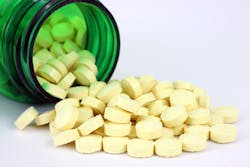4 supplements that dental professionals need to discuss with periodontal patients
By Bobbie DelSasso, RDH, BS
“Immune Response” might easily be defined as the immune system attacking microorganisms that cause disease in our bodies. As we age, the body is less able to assimilate the nutrients required for optimal health, so we need diets high in fruit, fiber, vegetables, and the right supplements. This is where antioxidants play a role. Antioxidants prevent cell oxidation and lower the occurrence of disease, aging, and cancer. It is a fact that periodontal disease is more prevalent in 60 year olds than 20 year olds — even though seniors are more dental savvy and brush better — and it’s likely due to the body’s inability to fight off bacteria and chemicals as easily as when you are young.
Loma Linda University researchers3 ran a study a few years ago showing that a nutritional supplement alone, without any other dental treatment, significantly combatted the effects of periodontal disease, with less bleeding and smaller pocketing present. The nutritional supplements used in the study were grape seed extract, CoQ10, folic acid, and echinacea.
Here are some of the documented effects1,2 that these supplements had on periodontal disease:
- Grape seed extract: Is a powerful antioxidant with 20 to 50 times the potency of vitamins C and E. Naturopaths have been using it for years to help treat arthritis, skin problems, and other inflammatory conditions. For periodontal disease in particular, it prevents the bacteria from colonizing. This is an important fact because it’s the colonization of bacteria that has made us look at plaque now as a biofilm, which also helps give it credence and its link to many systemic diseases. Biofilms are aggravated colonies of bacteria in their pure form. Biofilms are highly resistant to antibiotic treatment and are responsible for otitis media in kids, bacterial endocarditis, Legionnaires’ disease, and cystic fibrosis. They are also responsible for infections that hospital patients can get from catheters, implants, etc.
- CoQ10: Improves healing. It’s vital to the production of cellular energy and immune system function, and has been used in medicine for congestive heart failure, Parkinson’s and cancer. A woman naturally will produce 50% more during pregnancy to aid in development of the placenta. One of the significant things about statins and CoQ10 is that statins (like Lipitor) can lower CoQ10 levels, so it is important to take supplements to keep CoQ10 levels even.
- Echinacea: Inhibits enzymes that break down tissue.
- Folic acid: Ensures development of normal gum tissue. It binds to endotoxins (byproducts of bacteria) and renders them neutral. It can prevent periodontal disease, and it can help in healing if taken during periodontal treatment. It can even prevent re-occurrence if taken after periodontal treatment.
All of these supplements must still be taken with a diet high in fruits and vegetables to ensure proper immune function. But wouldn’t it be nice to be able to talk to your patients about this and help them understand the links and how important supplements are as we age?
Many companies now support the need for change toward treatment of total health of the patient. One such company is Pharmaden,4 which deals with nutraceuticals (vitamins and supplements to improve dental as well as physical health). Other companies such as Oragenics and Xlear exist as well and can help dentists and physicians educate and treat their patients about improving their overall health.
The American Academy for Oral Systemic Health is at the forefront of bridging the gap between medicine and dentistry to help educate and improve the lives of patients. AAOSH is about helping medicine and dentistry better understand the groundswell of science happening around them, as well as how to integrate it into their practices for better patient care. Through their annual scientific sessions, AAOSH brings together companies like Pharmaden, Xlear, Oragenics, and others that help dental and medical professionals learn new technologies and clinical research to treat patient’s total health. It is only through more knowledge and advanced skills that we can empower each other and ultimately our patients. We could just go with the status quo and not change a thing, but why would we, when medical costs are soaring, and diabetes, periodontal disease and other inflammatory disease are rampant, yet easily curable? It only takes a click to begin, so do it www.aaosh.org.
Bobbie DelSasso, RDH, BS, graduated from Marquette University College of Dentistry, Dental Hygiene Department in 1979. She was a coordinator for a Seattle Study Club for 15 years, event planning, and is a practicing hygienist for the director of that study club for 25 years. Bobbie is the executive director with AAOSH (American Academy for Oral Systemic Health), and she can be reached at [email protected].
References:
- Neiva RF, Steigenga J, Al-Shammari K, Wang H-L. Effects of specific nutrients on periodontal disease onset, progression, and treatment. Journal of Clinical Periodontology, 2003; 30:579-588.
- Brock GR, Butterworth CJ, Matthews JB, Chapple ILC. Local and systemic total antioxidant capacity in periodontitisand health. Journal of Clinical Periodontology, 2004; 31:515-521.
- Harpenau L, Cheema A, Zingale J, Chambers D, Lundergan W. Effects of nutritional supplementation on periodontal parameters and c-reactive protein. Abstract submitted for publication. University of the Pacific.
- www.PerioEducation.com
